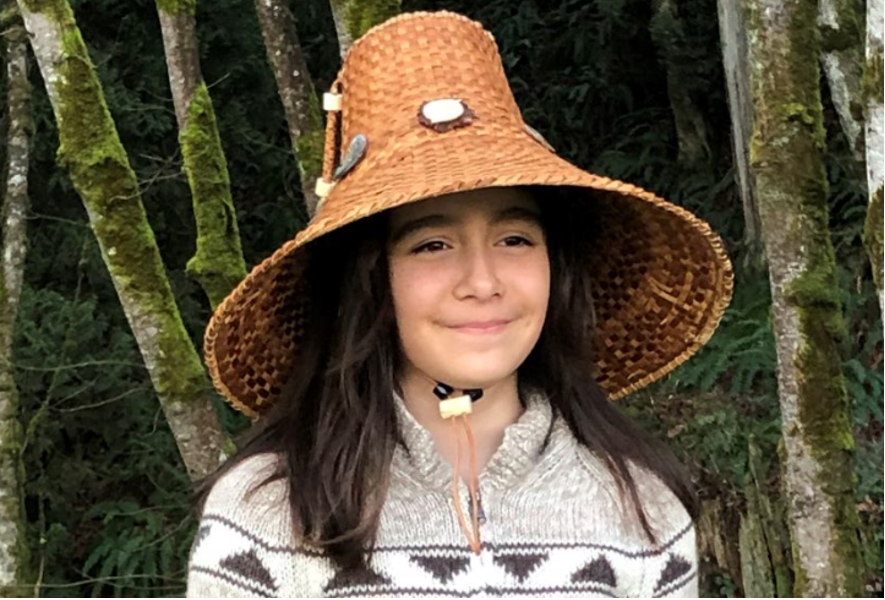
“I like being outside in nature, the different landscapes, and getting away from the noisiness. There’s nothing like being outside; it’s such a beautiful thing to be able to smell the seasons in the air,” she said.
This year, a member of the K’ómoks First Nation created all of the 2021 Virtual SFI Annual Conference speaker gifts out of sustainably harvested cedar bark.
Mahatta is the daughter of Ken Price, the Manager of Partnerships at Mosaic Forest Management, an SFI-certified organization. Companies that are certified to the SFI Forest Management Standard are committed to responsible forestry practices, respecting Indigenous rights, protecting water quality, biodiversity, wildlife habitat, and species at risk. Ken has also participated as a mentor in Project Learning Tree Canada’s (PLT Canada) Green Mentor Program.
This year, Mahatta created unique and handmade woven cedar bark gifts for the 2021 Virtual SFI Annual Conference speakers. She weaves her creations out of sustainably harvested cedar bark from an SFI-certified forest in the Comox Valley—the traditional unceded territory of the K’ómoks First Nation—on Vancouver Island in British Columbia, Canada. Mahatta makes hats, baskets, hearts, roses, pouches, and headpieces, and she wants to learn even more techniques.
Hats are one of her favorites to create, and though the process of preparing cedar and weaving a hat can take more than 30 hours and requires precision when cutting cedar strips, nothing is wasted. Mahatta’s many years of experience have given her the ability to know exactly how many pieces can be made from a bundle of cedar bark. Unused or too short bark strips become part of the smaller items Mahatta creates, like baskets and woven roses.
Creating the gifts from SFI certified forestlands
First, Mahatta looks for a tree with straight grain that is wide enough to hug. She harvests the cedar bark and thanks the tree for providing her people with this gift for thousands of years. Next, she and her family split the outer layer of bark from the inner layer, bundle it, and dry it in a dark, cool place for at least two years.
When the bark is ready for weaving, Mahatta soaks the cedar in warm water for a few hours, so she can then split it into even widths. After, she thins each piece to similar, workable thicknesses. Finally, she cuts each piece to the correct length for the project. Sometimes Mahatta will also dye some of the cedar to create variety in her patterns.
After all the prep work, she can then begin weaving the bark into her unique creations. And though the COVID-19 pandemic has limited in-person gatherings, Mahatta still finds ways to continue her artistic growth and connect with others around weaving.
“I connect with aunts, uncles, and cousins, and we still share ideas about different ways to finish a basket or hat. Sometimes you’ll ask questions, and maybe with help, you won’t need to tear a piece apart and start over again. You definitely get a lot of inspiration from each other.”
This summer, Mahatta has been camping, fishing, and mountain biking, feeling inspired and a little more adventurous after connecting with SFI and others who share her love for forests. Her new bike gives her the opportunity to travel on her own more, spending time in the certified woodlands around her house while experiencing Vancouver Island’s world-class trails.
“I truly appreciate the opportunity to make the gifts for the SFI Annual Conference. I hope you all enjoy the gifts that I have created through my teachings.”
The K’ómoks First Nation
The K’ómoks First Nation is a close partner of SFI. They are certified to the SFI Small-Scale Forest Management Module for Indigenous Peoples, Families and Communities, which means that they are committed to responsible forestry practices, protecting water quality, biodiversity, wildlife habitat, and species at risk. They have also used PLT Canada’s Green Jobs wage matching program to hire a local youth, accessed PLT Canada’s Green Skills Training Fund (a fund for Indigenous communities to design and deliver forest-focused training opportunities) for first aid and forestry equipment training, and contributed to PLT Canada’s A Guide to Green Jobs in Canada: Voices of Indigenous Professionals. PLT Canada is an initiative of SFI.
